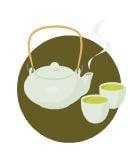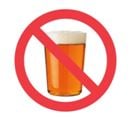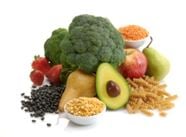Upper Gastrointestinal Tract Disorders
Gastroesophageal Reflux Disorder (GERD)
GERD, also known as heartburn or acid reflux, occurs when acid from the stomach flows back into the esophagus. Though stomach acid does not hurt the inside of the stomach, the cells of the esophagus are quite sensitive to acid attacks. The lower esophageal sphincter (LES) controls flow of food into the stomach. If the LES is loose, or does not close, the stomach contents can backflow into the esophagus.
All dietary treatment for GERD is focused on reducing the amount of acid secreted by the stomach, and reducing irritation caused by the acid to the esophagus. There are certain dietary and lifestyle recommendations that can help reduce gastric reflux.
1) Avoid foods that are irritating to the stomach:
- High fat foods. Fat remains in the stomach the longest, worsening GERD symptoms.
- Sugar and sweets

- Caffeine, coffee
- Chocolate
- Onions and garlic
- Alcohol
- Peppermint and spearmint
- Spicy foods
- Acidic foods
 2) Instead, consume low-fat foods that are not aggravating to the stomach: Drinking tea, or eating foods higher in protein can help reduce reflux symptoms. Choose foods without large amounts of spicy seasonings.
2) Instead, consume low-fat foods that are not aggravating to the stomach: Drinking tea, or eating foods higher in protein can help reduce reflux symptoms. Choose foods without large amounts of spicy seasonings.
3) Do not eat large, high-fat meals, ESPECIALLY close to bedtime. Small, frequent meals empty the stomach faster and decreases the amount of acid reflux into the esophagus.
4) Avoid smoking.
5) Lose weight, if overweight or obese.
6) Do not lie down 2-3 hours after a meal.
7) Eat until comfortably full; do not overeat. A large meal can stay in the stomach longer, exposing the esophagus to stomach contents.
8) Keep track of the foods that cause heartburn for you, write them down.
9) Elevate the head of your bed by putting woodblocks under the posts. Simply using pillows will not help.
Peptic Ulcers
A peptic ulcer is a sore on the surface of the stomach (gastric ulcer), on the small intestine (duodenal ulcer), or the esophagus (esophageal ulcer). Since most gastric ulcers are caused by a bacterium called Heliobacter pylori (H. pylori) or overuse of non-steroidal anti-inflammatory drugs (NSAIDS), it’s important to consult your doctor. There are some dietary recommendations that may be helpful for those with peptic ulcers:
 1) Avoid gastric irritants. Large amounts of alcohol, carbonated beverages, caffeine, chocolate, chili, and peppers increase acid secretion which can worsen ulcers. Other herbs and seasonings are okay to use.
1) Avoid gastric irritants. Large amounts of alcohol, carbonated beverages, caffeine, chocolate, chili, and peppers increase acid secretion which can worsen ulcers. Other herbs and seasonings are okay to use.
2) Consume a balanced diet, rich in fruits, vegetables, and fiber. There is a study that showed increasing the amount of dietary fiber improved symptoms in patients with duodenal ulcers.
3) Do not smoke.
4) Avoid taking aspirin or other NSAID drugs, such as ibuprofen. Ask your doctor about Tylenol as an alternative if you must take pain relieving medication.
5) Relax and de-stress. Sometimes too much stress can exacerbate ulcers. Try a yoga class, meditation, tai chi, or other stress reducing programs.
Literature
The effects of dietary fat and calorie density on esophageal acid exposure and reflux symptoms.
Fox M, Barr C, Nolan S, Lomer M, Anggiansah A, Wong T.
Clin Gastroenterol Hepatol. 2007 Apr;5(4):439-44. Epub 2007 Mar 23.
http://www.webmd.com/heartburn-gerd/guide/heartburn-foods-to-avoid
http://digestive.niddk.nih.gov/ddiseases/pubs/gerd/
Potymkina TE.
Vopr Pitan. 2011;80(1):46-50. Russian.
http://www.umm.edu/altmed/articles/peptic-ulcer-000125.htm